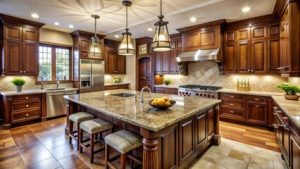Cabinet Refacing is a practical and cost-effective option for those who want to give their kitchen an updated look without the expense of a remodel. It also allows homeowners to experiment with different styles without disrupting their daily lives.

Lower-end refacing options apply laminates to cabinet surfaces, which look cheap and fake and are vulnerable to water exposure that can cause them to swell. They are also difficult to repair. Contact Cabinet Refacing Sacramento for professional help.
Cabinet refacing is an affordable way to refresh your kitchen without going through the expense of a full remodel. Refacing allows you to update your cabinets with a variety of materials to suit your taste and design aesthetic. You can choose from different colors and finishes, including natural wood and laminates. Regardless of the material you choose, you should thoroughly clean your cabinets before refacing them to ensure that adhesive veneers and paint stick properly.
Solid wood refacing provides durability and timeless beauty that lasts for years to come. It also withstands wear and tear better than less durable options, such as engineered wood or laminates. It is also a great choice for people who want to maintain the natural look of their kitchens. However, solid wood is expensive and requires routine maintenance to prevent water damage.
Another popular option is medium-density fiberboard (MDF). This type of material has a smooth surface and is relatively inexpensive. It is resistant to moisture, rot, and termites. It can also be refinished multiple times, providing a long-lasting finish. However, MDF can warp if exposed to heat or humidity.
Plywood with a veneer core is another popular option for cabinet refacing. It is easy to apply and offers a beautiful, natural appearance. It is also a cost-effective option that can be refinished many times. It is strong and dimensionally stable, which makes it an excellent choice for face-framing and larger surfaces. It also does not need nails, and it is available in a wide range of colors.
Refacing is a great alternative to replacing your cabinets, which requires removing and hauling away your old cabinets, resulting in waste and disposal issues. Replacing your cabinets is also more expensive than refacing, and there is a greater chance of floor, wall, and trim mismatching.
Before starting a refacing project, it is important to inspect your cabinets and kitchen space for issues such as broken hinges or stuck drawers. Ignoring these problems will cause them to continue to be problematic after refacing is complete. If you find significant problems, it may be more cost-effective and time-efficient to invest in a complete kitchen replacement.
Laminate
Laminate is an affordable way to give your outdated cabinets a modern facelift without the cost of a complete replacement. It’s available in a variety of designs, including realistic wood grain textures and custom color options that mimic premium cabinet materials. With this versatile option, you can achieve a sleek, contemporary aesthetic that’s perfect for any kitchen design.
Laminate cabinet refacing is the process of covering existing cabinet surfaces with new laminate material. The old surfaces are removed, cleaned, and sanded before the application of the laminate material. The result is a smooth, glossy finish that can stand up to the wear and tear of daily kitchen use. This option is ideal for homeowners who want to update their kitchen without the expense and hassle of a full remodeling project.
When it comes to choosing the right laminate for your cabinet refacing, there are two main types to consider: high-pressure laminate (HPL) and low-pressure laminate (LPL). HPL is created by applying multiple layers of plastic to particle board under extreme heat and pressure. It’s then topped with kraft paper that has been printed with a pattern and sealed with a clear resin. This type of cabinet refacing is durable, easy to clean, and comes in a range of colors and finishes to match any style.
LPL is a budget-friendly alternative to HPL, but it’s not as durable or as long-lasting. It’s created by gluing a sheet of synthetic material to particle board. The resulting surface is then covered with an image of natural wood or another design. Like HPL, it’s easy to clean and offers a wide range of colors and patterns to choose from.
If you’re considering a cabinet refacing project, be sure to consult with an experienced professional. Attempting to do it yourself can lead to costly mistakes and subpar results. A professional will have the specialized tools, expertise, and experience to ensure a streamlined, precise transformation that will elevate your space.
Pressure-sensitive wood back veneers
A popular alternative to solid wood veneer, backed wood veneers are a great way to revitalize your surfaces. They are made of real wood with a paper backing that is pre-coated with pressure sensitive adhesive. This type of veneer can be applied to almost any surface including metal and plastic. It can be used to reface cabinets, doors, and furniture and is easy to install. It also offers a wider variety of options when it comes to design and color.
Before beginning a project with backed veneers it is important to prepare the surface. It should be free of dust, oil, and other contaminants that will prevent the adhesive from adhering properly. The veneer should also be cut to a size that will fit the surface. A good rule of thumb is to cut the veneer slightly larger than the actual surface area to allow a margin of error. After cutting the veneer to size it is a good idea to lightly sand the edges to ensure they will be smooth and flush with the surrounding surfaces.
When applying a PSA veneer it is important to use a scraper tool that will provide strong and durable adhesion. Start at the center of the veneer and work toward the edges using a circular motion. This will remove any air bubbles and create an excellent bond. It is important to avoid pulling the veneer off from the surface as this will stretch it and lead to ripples in the finish.
Backed wood veneers are available in both 10 and 20 mil thicknesses and are made of either a natural or engineered species of wood. They contain no added urea formaldehyde and are rigid yet pliable. They can be trimmed and stained just like traditional veneer, but the process is much faster and easier.
Backed wood veneers can be applied to both flat and slightly curved surfaces opening up a world of design possibilities for your projects. This type of veneer is ideal for reviving old furniture or making accent walls in your home. It is important to test the PSA veneer and surface for compatibility prior to starting your project.
Plywood with a veneer core
Cabinet refacing is an affordable way to upgrade an outdated kitchen without undertaking a full remodel. Refacing can help homeowners embrace new styles, boost home value and increase functionality. However, the process isn’t suitable for every home. Depending on the condition of existing cabinets, the best option may be to replace them entirely. Before starting a refacing project, homeowners should carefully evaluate their home improvement skills and make sure they’re up for the challenge of completing the work. This requires careful measuring, cutting and safe tool use.
The face veneer on a plywood panel focuses on visual appeal and finishing, but the core veneer plays a critical role in the material’s structural integrity. The material’s multilayered construction offers exceptional bending strength and dimensional stability. It also provides a strong and attractive surface that can be painted or stained to match any design. Several species of hardwoods and softwoods are used to manufacture veneer core plywood, but the core’s appearance depends on how it is processed. It may contain knots, slight color variations or other minor imperfections that don’t affect the finished product.
When people choose to replace their old cabinets, they can opt for either a standard veneer core or a solid lumber core. The former consists of layers of hardwood veneers bonded together with alternating grain directions, making it a durable, stable material. It is ideal for cabinetry, but it can be a little pricey. The latter is made from strips of solid wood that are bonded to a layer of MDF, offering a more cost-effective and versatile option. However, it isn’t as strong as a solid-wood veneer core.
The layered nature of veneer core plywood allows for easy machining and provides a good balance between strength and aesthetics. It is also more lightweight than composite options and has excellent screw-holding capacity. The quality of the inner plies also impacts the overall performance and strength of the material. A higher number of plies does not necessarily translate to better machinability or stronger material, as the thickness of each ply varies. In addition to the strength and stability of the inner plies, the type of glue used to laminate the layers can impact the final performance of the material.




